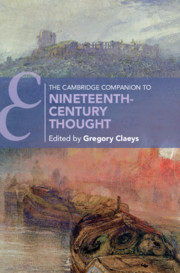Book contents
- The Cambridge Companion to Nineteenth-Century Thought
- The Cambridge Companion to Nineteenth-Century Thought
- Copyright page
- Contents
- Notes on Contributors
- Acknowledgements
- Chronology
- 1 Introduction
- 2 State and Individual in Political Thought
- 3 Remaking Theology: Orthodoxies and Their Critics
- 4 Philosophy in the Wake of Hegel*
- 5 The Origins of the Social Sciences
- 6 Historical Methods in Europe and America
- 7 Capitalism and Its Critics
- 8 Individuality, the Self and Concepts of Mind
- 9 Social Darwinism
- 10 Feminist Thought
- 11 Race and Empire in the Nineteenth Century
- 12 Patterns of Literary Transformation
- Further Reading
- Index
- Cambridge Companions to …
8 - Individuality, the Self and Concepts of Mind
Published online by Cambridge University Press: 08 June 2019
- The Cambridge Companion to Nineteenth-Century Thought
- The Cambridge Companion to Nineteenth-Century Thought
- Copyright page
- Contents
- Notes on Contributors
- Acknowledgements
- Chronology
- 1 Introduction
- 2 State and Individual in Political Thought
- 3 Remaking Theology: Orthodoxies and Their Critics
- 4 Philosophy in the Wake of Hegel*
- 5 The Origins of the Social Sciences
- 6 Historical Methods in Europe and America
- 7 Capitalism and Its Critics
- 8 Individuality, the Self and Concepts of Mind
- 9 Social Darwinism
- 10 Feminist Thought
- 11 Race and Empire in the Nineteenth Century
- 12 Patterns of Literary Transformation
- Further Reading
- Index
- Cambridge Companions to …
Summary
Friedrich Nietzsche, writing in the 1880s, foretold a time when ‘psychology shall be recognized again as the queen of the sciences, for whose service and preparation the other sciences exist’. As always with this ‘dancing’ philosopher, the statement invites different interpretations. It seems to say that psychology is the end point of knowledge, yet it gives no hint as to what this psychology is.
- Type
- Chapter
- Information
- The Cambridge Companion to Nineteenth-Century Thought , pp. 141 - 162Publisher: Cambridge University PressPrint publication year: 2019
- 4
- Cited by

